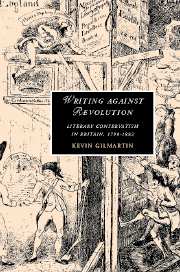Book contents
- Frontmatter
- Contents
- Illustrations
- Acknowledgments
- List of abbreviations
- Introduction: Reconsidering counterrevolutionary expression
- 1 In the theater of counterrevolution: loyalist association and vernacular address
- 2 “Study to be quiet”: Hannah More and counterrevolutionary moral reform
- 3 Reviewing subversion: the function of criticism at the present crisis
- 4 Subverting fictions: the counterrevolutionary form of the novel
- 5 Southey, Coleridge, and the end of anti-Jacobinism in Britain
- Notes
- Bibliography
- Index
- CAMBRIDGE STUDIES IN ROMANTICISM
2 - “Study to be quiet”: Hannah More and counterrevolutionary moral reform
Published online by Cambridge University Press: 22 September 2009
- Frontmatter
- Contents
- Illustrations
- Acknowledgments
- List of abbreviations
- Introduction: Reconsidering counterrevolutionary expression
- 1 In the theater of counterrevolution: loyalist association and vernacular address
- 2 “Study to be quiet”: Hannah More and counterrevolutionary moral reform
- 3 Reviewing subversion: the function of criticism at the present crisis
- 4 Subverting fictions: the counterrevolutionary form of the novel
- 5 Southey, Coleridge, and the end of anti-Jacobinism in Britain
- Notes
- Bibliography
- Index
- CAMBRIDGE STUDIES IN ROMANTICISM
Summary
Although not as widely known and anthologized as Village Politics, Hannah More's History Of Tom White the Postilion (1795) and its sequel, The Way to Plenty, are in many respects more typical of the kind of writing through which her Cheap Repository Tracts (1795–8) achieved a leading role in the anti-radical and counterrevolutionary campaigns of the later 1790s. For this reason, Tom White can provide a useful preliminary map of More's reactionary fiction, and of the challenge it presents to our understanding of the literary history of romantic-period Britain, particularly the impact that counterrevolutionary movements had upon cultural politics in an age of revolution. The Tom White series is typical, to begin with, in its heterogeneous narrative structure (the dialogue of Village Politics is less characteristic of More's work), and in the pressure it brings to bear upon the social world More believed her readers inhabited. Like many of the Cheap Repository Tracts, Tom White serves up a moral parable that rests in the first instance upon a precisely situated sense of rural virtue:
Tom White was one of the best drivers of a post-chaise on the Bath road. Tom was the son of an honest labourer at a little village in Wiltshire: he was an active industrious boy, and as soon as he was old enough he left his father, who was burthened with a numerous family, and went to live with farmer Hodges, a sober worthy man in the same village. […]
- Type
- Chapter
- Information
- Writing against RevolutionLiterary Conservatism in Britain, 1790–1832, pp. 55 - 95Publisher: Cambridge University PressPrint publication year: 2007



